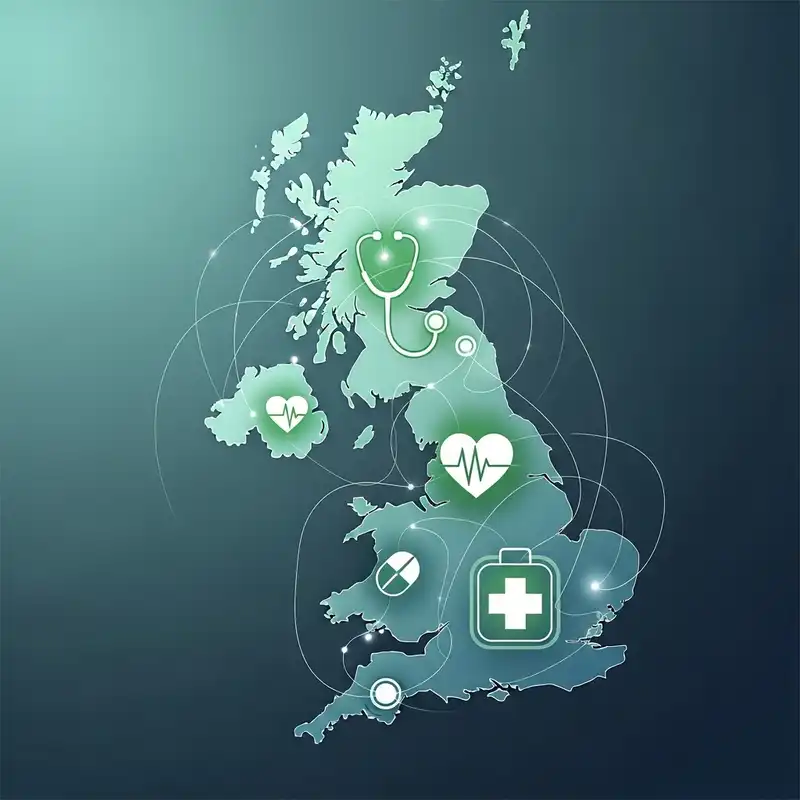TL;DR
A silent epidemic is sweeping across the UK's workforce. It doesn't always make the headlines, but its impact is profound, widespread, and growing. By 2025, projections indicate that over 40% of working-age Britons will be living with a painful musculoskeletal (MSK) condition.
Key takeaways
- Lost Gross Salary (illustrative): With 27 years until she reaches the state retirement age of 67, the total loss of her basic salary is £3,240,000.
- Lost Employer Pension Contributions: Her firm contributed a generous 10% to her pension. The loss of these direct contributions over 27 years amounts to £324,000.
- Lost Investment Growth: The real damage is the loss of decades of compound growth. That lost pension pot, with modest 5% annual growth, would have accumulated to well over £750,000 by retirement.
- Unfunded Specialist Care & Costs: To manage her condition effectively and maintain a reasonable quality of life, she might spend an average of £5,000 annually on private physiotherapy, specialist consultations, hydrotherapy, and new biologic drugs not readily available on the NHS. Over 27 years, this amounts to £135,000.
- Clear your entire mortgage, removing your biggest financial burden overnight.
Britains Silent Debilitator Musculoskeletal Crisis
A silent epidemic is sweeping across the UK's workforce. It doesn't always make the headlines, but its impact is profound, widespread, and growing. By 2025, projections indicate that over 40% of working-age Britons will be living with a painful musculoskeletal (MSK) condition. This isn't just a matter of a sore back after a long day; it's a national crisis of chronic pain, reduced mobility, and, most critically, devastating financial consequences.
For a higher-earning professional struck down in their prime by a severe MSK condition, the financial fallout could be catastrophic, potentially obliterating over £4.2 million in potential lifetime earnings and unfunded private treatment costs. This staggering figure highlights a terrifying reality: the state's safety net is simply not designed or equipped to handle the financial devastation of long-term debilitating illness.
The good news is that you are not powerless. A robust, private safety net can be constructed to shield you and your family. This definitive guide will illuminate the true scale of the UK's MSK crisis and reveal how a strategic combination of Private Medical Insurance (PMI), Income Protection, Critical Illness Cover, and Life Insurance can provide the fast-track medical care and financial resilience you need to protect your health, your family, and your future.
The Silent Epidemic: Unpacking the UK's Musculoskeletal Crisis
Musculoskeletal (MSK) conditions are injuries and disorders that affect the body's movement system. This complex network includes our muscles, bones, joints, tendons, ligaments, nerves, discs, and blood vessels. They range from the nagging and persistent, like lower back pain, to the acutely debilitating, such as severe rheumatoid arthritis.
Common MSK Conditions Affecting Britons Include:
- Back and Neck Pain: The single leading cause of disability worldwide and a primary reason for work absence in the UK.
- Arthritis: A group of over 100 conditions, including osteoarthritis ('wear and tear' arthritis) and inflammatory autoimmune conditions like rheumatoid arthritis and psoriatic arthritis.
- Repetitive Strain Injury (RSI): Often affecting wrists, hands, and elbows from prolonged office work or manual trades.
- Tendonitis and Bursitis: Painful inflammation of tendons and the fluid-filled sacs (bursae) that cushion the joints.
- Sciatica: Nerve pain that radiates from the lower back down the legs, caused by irritation of the sciatic nerve.
- Carpal Tunnel Syndrome: Compression of a key nerve in the wrist, causing numbness and pain in the hand and arm.
The statistics paint a grim picture of a nation in pain. According to the Office for National Statistics (ONS), musculoskeletal problems were responsible for the loss of 35.3 million working days in 2023, a stark figure that underscores their immense economic impact.
- Staggering Prevalence: Over 20 million people in the UK have an MSK condition, as confirmed by the charity Versus Arthritis in their landmark "State of Musculoskeletal Health 2023" report(versusarthritis.org). This means almost one in three people are affected, with the number set to rise.
- Workforce Impact: MSK conditions account for 22.2% of all sickness absence in the UK, making them a primary driver of lost productivity and a significant burden on businesses and the economy.
- Overwhelming NHS Burden: The NHS is under unprecedented pressure. As of early 2025, waiting lists for specialist care are at near-record highs. Trauma & Orthopaedic surgery consistently has one of the largest waiting lists of any specialty. According to the latest NHS England referral to treatment (RTT) data(england.nhs.uk), hundreds of thousands of patients are waiting over 18 weeks for essential treatment, with tens of thousands waiting over a year for life-changing procedures like hip and knee replacements.
This delay in treatment is not just an inconvenience; it's a fast track to a minor issue becoming a chronic, life-altering condition. While you wait, pain can intensify, muscles can weaken, and your ability to work—and earn a living—can completely evaporate.
The Financial Domino Effect: How an MSK Condition Can Topple Your Finances
The physical pain of an MSK condition is only half the story. The financial pain can be even more severe and long-lasting. The state provides a basic level of support, but it's a mere fraction of what most working families need to survive, let alone maintain their standard of living.
Statutory Sick Pay (SSP) in 2025 is just £116.75 per week. It only lasts for a maximum of 28 weeks, after which it stops completely. Beyond that, you may have to navigate the complexities of applying for Universal Credit or other disability benefits, which are typically means-tested and highly unlikely to cover your mortgage, school fees, and other significant family outgoings. (illustrative estimate)
Let's explore the catastrophic lifetime financial impact with a realistic, illustrative example.
Case Study: The £4 Million+ Cost of Chronic Illness (illustrative estimate)
Imagine Sarah, a 40-year-old solicitor earning £120,000 per year. She is diagnosed with severe, rapidly-progressing rheumatoid arthritis. The pain and joint damage become so severe that, after a long struggle, she is forced to stop working permanently. (illustrative estimate)
- Lost Gross Salary (illustrative): With 27 years until she reaches the state retirement age of 67, the total loss of her basic salary is £3,240,000.
- Lost Employer Pension Contributions: Her firm contributed a generous 10% to her pension. The loss of these direct contributions over 27 years amounts to £324,000.
- Lost Investment Growth: The real damage is the loss of decades of compound growth. That lost pension pot, with modest 5% annual growth, would have accumulated to well over £750,000 by retirement.
- Unfunded Specialist Care & Costs: To manage her condition effectively and maintain a reasonable quality of life, she might spend an average of £5,000 annually on private physiotherapy, specialist consultations, hydrotherapy, and new biologic drugs not readily available on the NHS. Over 27 years, this amounts to £135,000.
Total Potential Financial Loss: Over £4.4 Million
This devastating figure doesn't even account for lost bonuses, potential promotions, or the corrosive impact of inflation over nearly three decades. For anyone—from a self-employed electrician to a corporate director—the financial risk of long-term disability is life-shattering.
The Hidden Costs You Don't See Coming
Beyond the direct loss of income, a host of other expenses can emerge from the shadows, rapidly draining your savings and putting your family's financial security, and even your home, at risk.
| Expense Category | Examples of Costs in 2025 |
|---|---|
| Private Diagnostics | MRI scans (£500-£1,500), CT scans, Specialist consultations (£250-£500 per visit) |
| Ongoing Private Therapies | Physiotherapy, Osteopathy, Chiropractic sessions (£50-£100 per session, weekly) |
| Specialist Medical Procedures | Steroid injections (£300+), Minor day-case surgery (thousands) |
| Essential Home Modifications | Stairlifts (£2,000-£5,000+), Accessible wet rooms (£5,000-£10,000), Ramps & Rails |
| Specialist Equipment & Aids | High-spec ergonomic chairs (£1,000+), standing desks, mobility aids, adapted cars |
| Loss of Employment 'Perks' | Loss of valuable company PMI, death-in-service benefits, and company car |
This financial cascade can turn a medical problem into a full-blown financial crisis, forcing families to make impossible choices between paying the mortgage and funding essential care.
The First Line of Defence: Private Medical Insurance (PMI) for Rapid Treatment
The single most effective way to combat the physical progression of an MSK condition is through early diagnosis and rapid treatment. This is where Private Medical Insurance (PMI) is indispensable. It provides a direct, accelerated pathway to specialist care, allowing you to bypass the severely strained NHS waiting lists.
Think of PMI as your health fast-track. When you develop symptoms like persistent joint pain, a "frozen shoulder," or a suspected sports injury, instead of waiting weeks for a GP appointment and then many more months for a specialist referral, you can be diagnosed and starting a treatment plan in a matter of days.
NHS vs. PMI Pathway: A Tale of Two Journeys
Let's compare the typical journey for someone with a suspected torn rotator cuff in their shoulder, a common and painful MSK injury.
| Stage | Typical NHS Pathway (2025) | Typical PMI Pathway (2025) |
|---|---|---|
| Initial Consultation | Wait 1-2 weeks for a GP appointment. | See a private GP or use a digital GP service within 24-48 hours. |
| Specialist Referral | GP refers to NHS orthopaedics. Current wait time: 18-35+ weeks. | Immediate "open referral" to a specialist of your choice. Seen within a week. |
| Diagnostics | Wait 6-12 weeks for an NHS MRI or ultrasound scan. | MRI or ultrasound scan scheduled at a private clinic within days. |
| Diagnosis | Diagnosis confirmed months after initial injury. Pain and weakness worsen. | Diagnosis confirmed within 1-2 weeks of first symptoms. |
| Treatment (e.g., Surgery) | Placed on a surgical waiting list. Current wait time: 20-52+ weeks. | Keyhole surgery scheduled at a private hospital at your convenience, often within a month. |
| Post-Op Rehabilitation | Limited number of group NHS physiotherapy sessions, often with long gaps. | Comprehensive, one-to-one, tailored post-op physiotherapy course begins immediately. |
| Total Time from Symptom to Recovery | 9 - 20+ months | 4 - 8 weeks |
This staggering difference in timing is crucial. With PMI, the shoulder is treated before significant muscle wastage (atrophy) occurs, leading to a faster, more complete recovery and a swift return to work and normal life. On the NHS pathway, the long delays can lead to irreversible damage, chronic pain, a "frozen" joint, and a prolonged, financially damaging absence from work.
Key Benefits of PMI for MSK Conditions:
- Rapid Diagnostics: Get the MRI, CT, X-ray, or ultrasound you need without the agonising wait.
- Choice of Specialist: Access to the UK's leading orthopaedic surgeons, rheumatologists, and pain management experts.
- Choice of Hospital: Choose a clean, comfortable private hospital with a private room for your treatment.
- Advanced Therapies & Drugs: Access to cutting-edge treatments, biologics, and rehabilitation programmes that may have restricted availability or not be approved on the NHS.
- Comprehensive Mental Health Support: Many modern PMI policies include extensive support for the psychological impact of living with chronic pain and disability.
Shielding Your Livelihood: The Crucial Role of Income Protection Insurance
While PMI tackles the medical problem head-on, Income Protection (IP) insurance tackles the equally devastating financial problem. For any working adult, it is arguably the single most important insurance policy you can own. IP is designed with one clear purpose: to replace a significant portion of your monthly income if you are unable to work due to any illness or injury, including the full spectrum of MSK conditions.
It pays a regular, tax-free monthly benefit directly to your bank account. This allows you to continue paying your mortgage, bills, school fees, and general living expenses, removing financial stress so you can focus 100% on your recovery.
Understanding the Key Features of Income Protection
Choosing the right IP policy is vital, as the small print can make a huge difference at the point of claim. At WeCovr, we specialise in helping our clients navigate these complexities to ensure their cover is watertight and appropriate for their profession.
The most critical feature is the Definition of Incapacity:
- Own Occupation: This is the gold standard and the definition we recommend for almost all clients. The policy pays out if you are medically unable to do your specific job. A surgeon with a hand tremor or a self-employed electrician with a debilitating back injury would be covered, even if they were physically capable of working in a different, lower-paid role.
- Suited Occupation: A weaker definition. The policy pays out only if you can't do your own job or a similar one for which you are qualified by education or experience.
- Any Occupation / Activities of Daily Living (ADL): The most basic and restrictive definitions. They typically only pay out if you are so unwell you cannot do any job whatsoever or are unable to perform a set number of basic daily tasks like washing or dressing.
Other Critical Policy Choices:
| Feature | Description | Key Consideration |
|---|---|---|
| Deferment Period | The waiting period from when you stop work to when payments begin (e.g., 4, 13, 26, or 52 weeks). | Align this with your employer's sick pay policy and your emergency savings to keep premiums affordable. |
| Level of Cover | You can typically insure up to 65-70% of your gross annual income. | The benefit is paid tax-free, so this is usually close to your normal take-home pay. |
| Payment Term | Choose short-term (pays out for 1, 2, or 5 years per claim) or long-term (pays until your chosen retirement age). | For chronic MSK conditions, a long-term policy is essential for true peace of mind. |
Specialist Cover: Personal Sick Pay for High-Risk Jobs
For those in physically demanding professions—such as tradespeople, nurses, warehouse operatives, and drivers—the risk of a career-ending MSK injury is significantly higher. For these clients, a specialised policy often called Personal Sick Pay insurance can be an excellent fit. These policies are often simpler than traditional IP, sometimes with more straightforward underwriting and clear payment triggers designed for the unique risks of manual work.
Financial Security in a Crisis: Critical Illness Cover and Life Insurance
While Income Protection provides a vital monthly income, Critical Illness Cover (CIC) and Life Insurance provide crucial lump-sum payouts for specific, severe events. They work alongside IP and PMI to create a comprehensive financial shield for you and your family.
Critical Illness Cover (CIC)
A CIC policy pays out a large, tax-free lump sum if you are diagnosed with one of a list of predefined serious conditions. While general back pain or early-stage arthritis won't trigger a claim, many of the most severe outcomes related to the MSK system are covered by comprehensive policies.
Potential MSK-Related Triggers for a CIC Payout:
| Condition | How It Might Be Covered on a Policy |
|---|---|
| Severe Rheumatoid Arthritis | Most comprehensive policies cover RA if it meets a specific severity definition (e.g., causing significant deformity in three or more specific joints). |
| Paralysis / Loss of Limb | The total and permanent loss of use of a hand or foot, or the paralysis of a limb, is a standard definition on almost all CIC policies. |
| Major Head Trauma | A severe head injury resulting in permanent neurological deficit and an inability to work is a core covered condition. |
| Third-Degree Burns | Severe burns affecting a significant portion of the body are a standard covered condition. |
The lump sum from a CIC policy can be genuinely life-changing in a crisis. It could be used to:
- Clear your entire mortgage, removing your biggest financial burden overnight.
- Pay for significant home adaptations like a stairlift or accessible bathroom.
- Fund pioneering private medical treatments or technologies not covered by PMI.
- Create an investment fund to provide a long-term income for you or your family.
- Allow your partner to take an extended period off work to become a carer.
Life Insurance and Its Variations
While most MSK conditions are not fatal, they are a powerful reminder of our vulnerability. They underscore the fundamental importance of protecting your family's financial future against any eventuality.
- Life Protection (Level or Decreasing Term Assurance): The simplest and most affordable form of cover. It pays a lump sum to your loved ones if you pass away during the policy term. This is essential for clearing a mortgage and other debts, and for providing a capital sum for your family to live on.
- Family Income Benefit: A thoughtful alternative or supplement to a lump sum policy. Instead of one large payment, it provides your family with a regular, tax-free monthly or annual income until the policy term was due to end. This can be easier for a grieving family to manage and directly replaces your lost salary in a more structured way.
- Gift Inter Vivos Insurance: A specialist form of life insurance used for estate planning. If you gift a significant asset (like a second property or a large cash sum) to your children, it could be subject to a hefty Inheritance Tax bill if you pass away within seven years of making the gift. This policy is a simple life assurance plan designed to pay out a lump sum to cover that potential tax liability, ensuring your gift reaches its intended recipients in full.
A Proactive Approach: How WeCovr Creates Your Personalised Protection Strategy
The UK's musculoskeletal crisis is a clear and present danger to the health and wealth of millions of working people. Navigating the complexities of Private Medical Insurance, Income Protection, and Critical Illness Cover alone can be a daunting and risky process. The definitions, exclusions, and myriad options require expert interpretation to ensure you get the cover you actually need when it matters most.
This is where an independent, expert protection broker like WeCovr provides invaluable guidance. We don't work for a single insurer; we work for you. Our mission is to secure your financial wellbeing.
Our process is built entirely around you:
- Deep-Dive Assessment: We start with a thorough conversation to understand your profession, income, family situation, existing provisions, and specific health and financial concerns.
- Whole-of-Market Comparison: We use our expertise and technology to search and compare policies from all the UK's leading insurers, finding the most comprehensive and competitively priced options for your unique needs.
- Expert Advice & Demystification: We explain the pros and cons of each policy in plain English. We demystify the jargon—especially the crucial 'definition of incapacity' for Income Protection—so you can make a truly informed decision with confidence.
- Application and Trust Support: We handle all the paperwork, liaise with the insurer's underwriters on your behalf, and can help place your policies into trust to ensure the proceeds go to the right people quickly and tax-efficiently.
We believe that protection is not just a transaction; it's a long-term partnership in your wellbeing. As part of our commitment to our clients' holistic health, we provide all our customers with complimentary access to CalorieHero, our exclusive AI-powered nutrition and calorie tracking app. We know that proactive health management, such as maintaining a healthy weight, is one of the most effective ways to reduce the risk and impact of MSK conditions by lessening the strain on your back, hips, and knees. It's just one way we go above and beyond.
Your Protection Jigsaw: How the Pieces Fit Together
A truly robust financial plan uses these different insurance types to create a multi-layered defence against the physical and financial impact of an MSK condition, or any other serious illness or injury.
- PMI pays for your private treatment, getting you back on your feet and back to work as fast as humanly possible.
- Income Protection replaces your salary during your recovery, however long that takes, protecting your entire lifestyle.
- Critical Illness Cover provides a major tax-free cash injection if your condition becomes severe, giving you the capital to clear debts and adapt your life.
- Life Insurance ensures that, no matter what happens to you, your family's financial future is secure.
The musculoskeletal crisis is a national health burden, but it does not have to become your personal financial catastrophe. The mechanisms to protect yourself exist, they are accessible, and they are often more affordable than you think. By understanding the risks and taking proactive steps to implement a tailored protection strategy, you can face the future with confidence, knowing that your health, your income, and your family are shielded from life's most challenging uncertainties. Don't wait for pain to dictate your future. Take control today.
Sources
- Office for National Statistics (ONS): Mortality and population data.
- Association of British Insurers (ABI): Life and protection market publications.
- MoneyHelper (MaPS): Consumer guidance on life insurance.
- NHS: Health information and screening guidance.
































